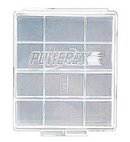weinerr
Registered
Just a heads up. Just returned from an outstanding week aboard the Utila Aggressor II. Flying out of San Pedro Sula I had my carry on bags searched twice. At security everything, and I mean everything, was removed from backpack and Pelican box containing my UW video gear. While I didn't have anything confiscated, I did see others have their regular AA batteries taken away. At the gate there was a second security check, my bags were checked again and my AA rechargeable batteries were confiscated. Bottom-line batteries are not allowed in your carry on flying out of San Pedro Sula. Note I had a ton of AA's in my checked bag. As an aside, if you buy a drink after main security you will not be allowed to take it on the plane. Do you feel any safer?





